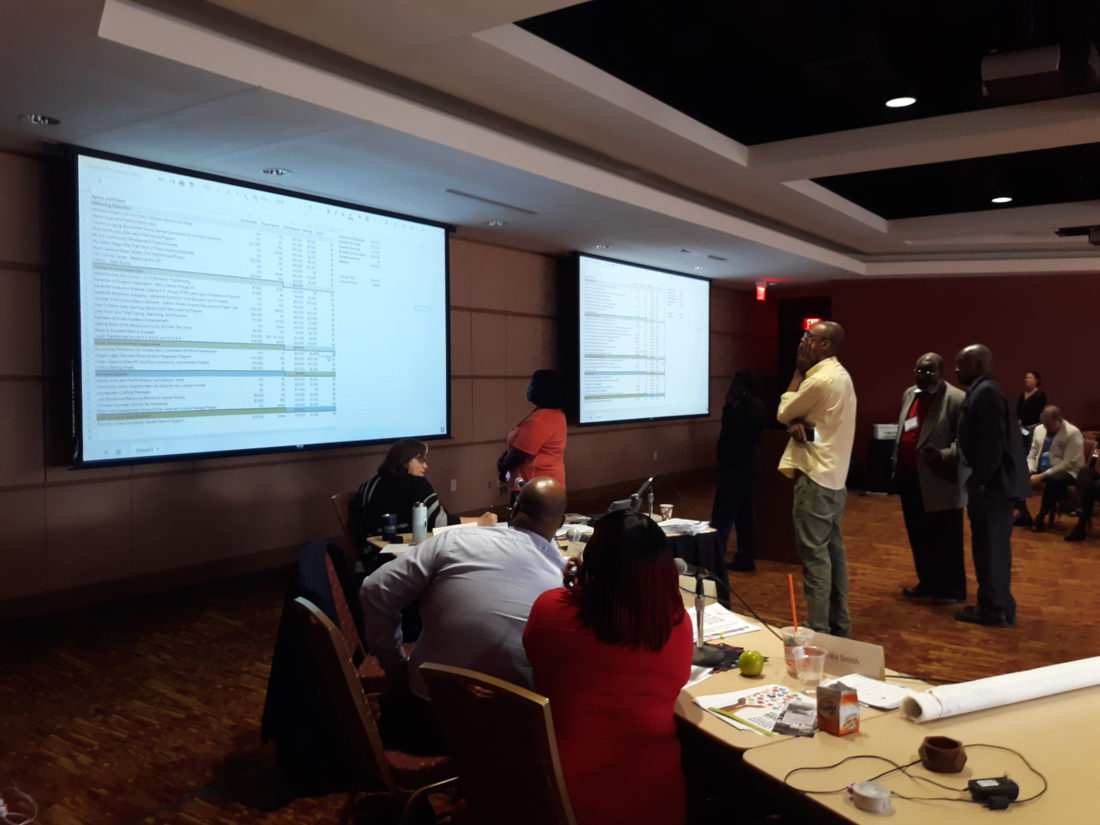The members of Asheville City Council’s Housing and Community Development Committee walked into a March 29 meeting at the U.S. Cellular Center Banquet Hall with $234,500 in Strategic Partnership Funds to hand out. Representatives from 30 area nonprofits walked into the same meeting with over $740,000 in funding requests. The only solution to that mismatch, suggested committee member Keith Young, would be a bit of divine intervention.
“I don’t know how to stretch $230,000 into three-quarters of a million. I just don’t know how to do it. Maybe if I had Jesus here with the fish, and he was feeding everybody, maybe we could do that,” Young said to laughter from the audience. “That’s kind of a tongue-in-cheek response, but it is tough.”
Although the committee did arrive at recommendations for the money, which must be approved by the full City Council at a later meeting, its members agreed that how the city doles out partnership funds needs revision. Sheneika Smith compared the situation to “pulling ourselves out of a pit,” while committee Chair Julie Mayfield, who joined the meeting by phone due to illness, said the high demand for grants called for tweaks to the process.
“I think what everybody’s hearing is that this doesn’t feel good for us, and it sure as heck doesn’t feel good for you,” Mayfield said. “We need to do something that fixes it.”
Cap it off
The most substantive change Mayfield proposed was a cap on the amount of money individual programs could request. This year’s asks spanned a $55,000 range, from $4,500 for a community summer day camp by Getting Back to the Basics to $60,000 for two programs by Youth Transformed for Life.
Allowing that variety of requests, Mayfield argued, forced committee members to decide between spreading limited resources broadly or concentrating on fewer programs to make a greater impact for each. She worried that the current approach, in which most nonprofits receive significantly less than their initial ask, is an inefficient use of city funds.
“We just have no idea whether some of these amounts are even meaningful for the organizations when they’re so small,” Mayfield said. “I don’t really want to give our money out if it’s really not going to be useful and it’s not going to enable them to accomplish what they said they’re going to do.”
Mayfield also suggested that the city’s funding be contingent on nonprofits raising additional outside money to fully support their programs. Young said that condition might work in future years, but he added that it would not be “in good faith” to impose the requirement for the current grant cycle.
While Smith didn’t directly weigh in on either of those changes, she expressed a desire to distribute funds more evenly between established and newly forming initiatives. “I don’t think we should leave people on empty just because we’re not familiar with their programs,” she said.
The committee reached no agreement about alterations to the grant program, but Young said he and his colleagues would revisit the topic at subsequent meetings. “We can do a better job of making sure that our processes are more efficient, streamlined and equitable, and I think that’s what we’ll have to do the next go-round,” he said.
By the numbers
Four of the 30 applicants walked away from the meeting with no funding: the North Carolina Glass Center, Asheville Area Arts Council, Asheville Symphony Orchestra and boys mentoring program Journeymen. Committee members did not publicly discuss why those particular requests didn’t get the nod.
In response to a question about those decisions by Jordan Foltz, director of Journeymen, Mayfield said the committee should be more transparent about its funding criteria. “If we’re not going to fund vehicles or capital improvements or things like that, we should say that,” she remarked.
The only nonprofit whose request was fully funded was the Christine W. Avery Learning Center, which received $20,000 for its early learning program. The two largest allocations, both of $21,667, went to My Daddy Taught Me That and Youth Transformed for Life; those groups had requested $40,000 and $60,000, respectively. The first organization provides mentoring to primarily minority and low-income adolescent males, while the second hosts after-school and summer programs for disadvantaged youths.
The smallest award went to the Asheville Art Museum Association, which received only $1,667 of its $9,500 request. Other organizations that received substantially less than requested included Hola Community Arts ($3,333 of $50,000), Mount Zion Community Development ($5,000 of $50,000) and Community Action Opportunities ($4,000 of $30,000).
Young emphasized that nonprofits shouldn’t take the size of the committee’s allocations personally. “It doesn’t mean that we don’t like your program, that your program isn’t doing the work,” he said. “It means that we simply have limited resources.
“You are a big part of our community and you are greatly appreciated,” Young continued. “Do not let the awards here today tell you otherwise.”
19-20 SPF Funding Recommendations by Daniel Walton on Scribd



Why is the city funneling so much money into religious organizations? Avery Learning Center states in their mission that they want to develop a “Christ-centered” curriculum. Religious organizations already rob local schools by not paying property taxes. They then get to double dip on the public by taking tax dollars to help “solve” the problems of underfunded public schools. How is this not respecting an establishment of religion?